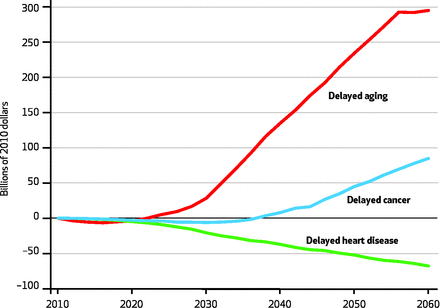 Can we age more slowly? And if so, what impact would senescence — delaying aging — have on health care costs on the U.S. economy? In addition to reclaiming $7.1 trillion over 50 years, we’d add an additional 2.2 years to life expectancy (with good quality of life).
Can we age more slowly? And if so, what impact would senescence — delaying aging — have on health care costs on the U.S. economy? In addition to reclaiming $7.1 trillion over 50 years, we’d add an additional 2.2 years to life expectancy (with good quality of life).
This is the calculation derived in Substantial Health And Economic Returns From Delayed Aging May Warrant A New Focus For Medical Research, published in the October 2013 issue of Health Affairs. The chart graphs changes in Medicare and Medicaid spending in 3 scenarios modeled in the study: when aging is delayed, more people qualify for Medicare and Medicaid, thus driving costs higher. Delaying cancer involves only a slight increase in costs, and delaying heart disease spending below the status quo.
The hypothesis is that by addressing the building blocks of aging, instead of attacking individual diseases, people would develop acute diseases leading to their mortality later in life. One of the authors of the study, Dana Goldman of the Schaeffer Center for Health Policy and Economics at USC , told NPR that “we’re starting to learn something about the biology that underpins aging — how cells age, what’s going on at the molecular level, and how we could manipulate genes to increase life span. So the science behind the aging process is improving.”
Researchers applied the “Future Elderly Model” (FEM) which was developed by the RAND Corporation in 1997 and models trends in health, peoples’ functional status, health economics, and other factors for people over 50 years of age in the U.S. (and 7 European countries including Denmark, France, Germany, Italy, the Netherlands, Spain, and Sweden).
Four scenarios were modeled:

- The status quo (baseline)
- Delaying cancer, assuming a 25% reduction in the incidence of cancer between 2010-30
- Delaying heart disease, assuming a reduction in heart disease incidence of 25% between 2010 and 2030
- Delayed-aging, which assumes research into the biology of aging and translates into therapies that “reduce and compress morbidity and mortality into a shorter period at the end of life.” This scenario assumes that the health benefits of delayed aging begin at puberty – the time when mortality rises exponentially according to The Influence of Genes on the Aging Process of Mice, seminal research in the journal Genetics from 2005.
On October 30-31, 2013, the NIH is holding a two-day Geroscience Summit to discuss the policy and economic issues of delaying aging — pending the U.S. government’s return-to-work.
Health Populi’s Hot Points: There is growing evidence that many healthy centenarians (people living beyond 100 years of age) have often dodged age-related diseases and have grown older, younger. The researchers of this paper, and other proponents of senescence, argue that manipulating genes, reducing daily calories consumed, and modulating hormone levels, could extend a person’s healthy lifespan. This has been shown in animal models.
The research in the Health Affairs paper compares the health system’s investing in a disease model versus in a delayed aging model of health.
If delayed aging is indeed a real possibility in humans, the economic question for the end-game (literally) is: can society’s economy afford to extend lives? Living longer could lead to people taking on a huge disease burden at the end of life, suffering multiple lethal issues for the health system to deal with both clinically and economically for Medicare. In addition, people who live longer lives would also add to the Social Security program demand for income support.
The $7.1 trillion benefit this study projects is based on aggregating the quality-adjusted life years that accrue from delaying aging vs. the current situation. Researchers imputed a value of $100,000 a year for each life-year saved, tallying to the $7.1 trillion yield. Could and would people work longer beyond the current retirement age? And would people even want to live longer?
The researchers conclude that “the major challenges of delayed aging appear to be of a fiscal nature, but they are manageable.” From an individual’s standpoint, it may be highly desirable to live longer: to witness one’s grandchildren and great-grandchildren’s growth and accomplishments; to witness innovations and discoveries; to be on one’s own long journey of self-discovery. But as for the “manageable” fiscal challenges, the public-at-large, as distinct from the individuals in that public, may have something else to say about the cost-benefit of delaying aging.




 Interviewed live on BNN Bloomberg (Canada) on the market for GLP-1 drugs for weight loss and their impact on both the health care system and consumer goods and services -- notably, food, nutrition, retail health, gyms, and other sectors.
Interviewed live on BNN Bloomberg (Canada) on the market for GLP-1 drugs for weight loss and their impact on both the health care system and consumer goods and services -- notably, food, nutrition, retail health, gyms, and other sectors. Thank you, Feedspot, for
Thank you, Feedspot, for  As you may know, I have been splitting work- and living-time between the U.S. and the E.U., most recently living in and working from Brussels. In the month of September 2024, I'll be splitting time between London and other parts of the U.K., and Italy where I'll be working with clients on consumer health, self-care and home care focused on food-as-medicine, digital health, business and scenario planning for the future...
As you may know, I have been splitting work- and living-time between the U.S. and the E.U., most recently living in and working from Brussels. In the month of September 2024, I'll be splitting time between London and other parts of the U.K., and Italy where I'll be working with clients on consumer health, self-care and home care focused on food-as-medicine, digital health, business and scenario planning for the future...